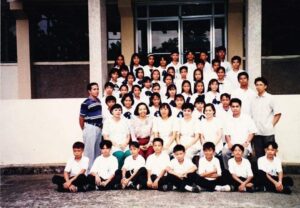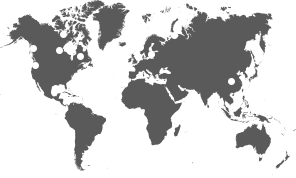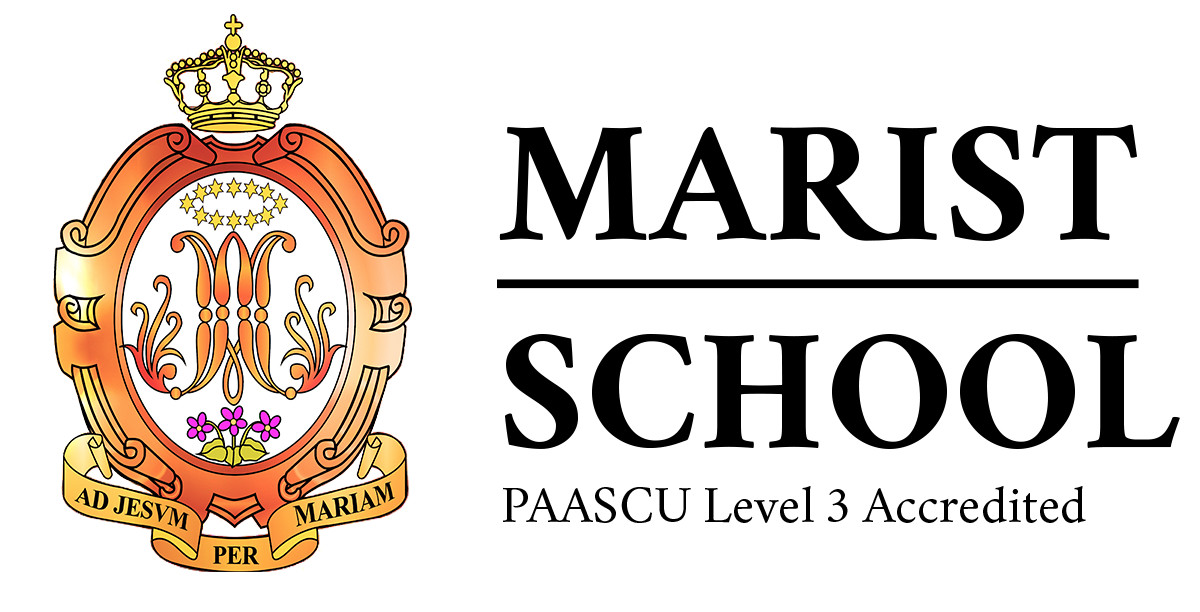COMMUNITY EXTENSION PROGRAM (CEP)
Rationale and Philosophy
To fully prepare the youth for adulthood there is a need to help them develop and hone personal and life skills as well as academic skills. This integral development of the young involves connecting what students learn in the classroom with real life situations where students learn best by doing, by service, and by reflecting on their own experiences.
The Community Extension Program is a formation program that is embodied in the development programs for students and personnel. It is integral to the academic program of the school. While instruction is the flesh and backbone that gives shape and provides the basic foundation to student development, the CEP is the heart and soul that gives vitality to the students’ overall formation by building and strengthening their character to become good Christians and virtuous citizens and to shape their own future while being guided by their Faith.
The CEP is also concerned with the formation of personnel, parents, alumni/alumnae and partners. It provides experiences that allow them to live out the Marist values and concern for the least favored. As an institutional program, the CEP serves as the fulfillment of the social and religious responsibilities of Marist School.
Objectives
The Community Extension Program of Marist School has the following objectives:
- Heighten awareness, inspire reflection and encourage volunteer action among students, personnel, parents, alumni, partners and beneficiaries on current issues and their effects on the well-being of God’s creation, especially the poor;
- Engage the Marist School community in outreach projects and activities that enrich classroom learning and the practice of Marist core values;
- Establish linkages with organized communities where youth and women are empowered to undertake income-generating activities to improve the quality of life in the family and in the community; and
- Foster partnerships and collaboration with governmental, non-governmental, private, and civic organizations and institutions in undertaking projects and activities that advocate mutual learning, values formation, and improvement in the lives of partners and beneficiaries
MARIST SCHOOL MISSION PARTNERSHIP PROGRAM (MSMPP)
RATIONALE
The Marist School Mission Partnership Program (MSMPP) is a commitment of collaboration between and among Marist School mission partners, i.e. individuals, groups, organizations, associations, congregations, and communities that support the mission of Marist School to “form good Christians and virtuous citizens”. The partnership is based on voluntary cooperation in different school programs and projects where mission partners participate in spreading the “good news”, evangelizing the young and animating one’s spirituality across cultures, faiths and sectors in society, especially and preferentially opting opting for solidarity with those in the periphery.
Marist School opens up venues for partnership in shared mission, common goals, mutual commitments, collective actions, and joint celebrations. The MSMPP is a continuing process of enrichment that promotes character and values formation, talents and skills development, and lifelong learning as a means of celebrating achievements, thanksgiving, deepening of faith, and spiritual growth of both mission beneficiaries and the benefactors.
OBJECTIVES OF THE MSMPP
- Expand the resource base of Marist School for wider implementation and greater sustainability of its programs for the youth, especially the least favored;
- Engage mission partners toward the achievement of significant shared goals and commitments that generate positive and sustainable impacts in the lives of program beneficiaries;
- Promote sharing of God-given gifts with people in the peripheries of society; and
- Foster solidarity with the Church’s call for service and compassion with the poor.
PROGRAMS UNDER Marist School Mission Partnership Program (MSMPP)
- MARIST SCHOLARSHIP PROGRAMS
Individuals or groups such as alumni batches or other organizations, may provide donations through fund-raising projects. These contributions are placed in a general scholarship fund, which is utilized for the scholarships and grants for gifted/talented and financially needy students following an established set of criteria.
- MARIST SCHOOL SPORTS DEVELOPMENT (MSSD) PROGRAM
The MSSD Program is a comprehensive sports development and training that aims to not only hone physical and sports skills but also mold the discipline and character of Marist School athletes. The MSSD Program has put Marist School athletes at a competitive advantage in major sports events like basketball, volleyball, baseball, soccer, swimming, chess, and athletics. Marist School athletes play in major sports leagues that pit them against their counterparts in schools like Ateneo, La Salle, Xavier, Don Bosco, international schools in Metro Manila, Claret, etc. A number of Marist School athletes pass and qualify for national, regional and international competitions under the banner of the Philippines.
Mission partners as individuals or groups may participate by financially supporting the operations of the program. Given that school resources are limited, contributions assuredly enables the participation of Marist School athletes in important sports leagues that could provide them the necessary training and exposure of their sports talents for their overall character formation and development.
- MARIST SCHOOL STUDENT ACTIVITY (MSSA) PROGRAM
The performance of Marist students in in-campus and off-campus academic, extra-curricular and co-curricular activities reflect their creativity, determination and discipline in honing their talents and competencies in the arts, information and communications technology, performing arts, Science and mathematics. The acceptance and recognition that Marist School students get in demonstrating their talents and competencies put them side by side with their counterparts in various fields. Dancers, debate teams, artists, public speakers and other club members confidently take part in competitions and performances that challenge their capabilities, evidently displaying their unique Marist discipline and holistic formation.
However, much is desired by the students, their mentors and coaches in augmenting financial and logistical support for these endeavors. Resources for practice sessions, preparations for competitions such as registration fees or costumes, materials and equipment to further enhance their competitive advantage are always a constant need. Mission partners may participate by providing support for these needs through financial or logistical means.
- PRIORITY SOLIDARITY PROJECTS OF THE MARIST BROTHERS’ EAST ASIA PROVINCE
In commemoration of the bicentenary of the foundation of the Marist Institute and the 10th anniversary of the formation of the East Asia Province, Solidarity Day was launched in 2018 in the Province so that all Marists of Champagnat (Marist Brothers, Lay Marists and Mission Partners), working together, can keep alive the spirit of the Founder, respond to the call of Pope Francis to get out of their comfort zones and go to the periphery to help the poor and make a difference in the lives of the needy in today’s society.
By organizing fundraising activities, Mission Partners can contribute to a Solidarity Fund that will be utilized in select priority projects that need assistance such as sustaining students among indigenous peoples in Palawan, aiding poor Christian students in Jolo and supporting the volunteer program of the Province, among others.
- NAMING OPPORTUNITIES FOR MARIST SCHOOL BUILDINGS AND FACILITIES
A company or any commercial enterprise, alumni batch, group or individual may sponsor the construction or retrofitting of a school building or facility. In honor of the endowment, the school presents the sponsor with the opportunity to participate in naming the building or facility.
MARIST SCHOOL AFTERNOON SHIFT PROGRAM (MSASP)
(A Community Outreach Program)
The Marist School Afternoon Shift Program is a four-year secondary course that caters mainly to financially-disadvantaged youth. Closely patterned after the regular secondary course of the school, it offers a curriculum that is co-educational, Catholic, integral, uniquely Filipino and distinctly Marist.
The aims of the program are as follows:
- To provide quality education to young boys and girls, enabling them to become good Christian and good citizens;
- To develop vocational or occupational skills to help them become productive members of society;
- To provide them basic learning skills to ensure lifelong learning and at the same time equip them with the necessary tools to pursue higher studies; and,
- To discover their individual talents and potentials and hone them to their full development.
Now, in its 25th year of existence, the program has produced graduates who have uplifted not only their own lives but the lives of their own communities, as well.
THE PROGRAM: A RETROSPECTION
By Ms. Christine Stokes

Marcellin’s call to make Marist education accessible to the “least favored” has indeed been a challenge to Marist School in Marikina. Unlike most schools of the Marist Brothers found in Mindanao and which started as mission schools in the rural areas, Marist School is located in an urban setting with most its clientele belonging to the middle and upper income groups. For years, this call has been raised considering that it is part of the Marist Charism.
In school year 1993- 1994, as the school was celebrating its 30th anniversary, the school president. Br. Brother Manuel V. de Leon, FMS, in one of its President’s Council meeting, raised the issue on how Marist School can concretely respond to its mission of providing quality education to the least favored. He mentioned that for many years only those who could afford to pay the regular tuition fees were admitted to enroll. It was in this meeting that the idea of opening evening classes came about. In December 1993, Br. Manuel had the opportunity to be invited to De La Salle, Greenhills in San Juan to observe the Adult Education Evening classes. The experience inspired him to push the idea and assigned a council member to gather more information from other schools offering the same program.
The following school year 1994-1995, a proposal was presented to the Board of Trustees for approval. A program director was designated to start communication with Department of Education Culture and Sports – National Capital Region (DECS-NCR) and work for the approval of the program. The Department furnished Marist School a checklist of all the requirements. Consultation meetings, development of the curriculum, and ocular visits, took place until finally a one-year permit for a ladderized program was granted in May 1995. The Department also recommended the offering of an afternoon shift instead of an evening class program; thus the name Marist School Afternoon Shift Program. Prior to the receipt of approval from the DECS-NCR, information on the plans to open this special program was disseminated to the community through the local communities and parishes. As early as April, screening of prospective students was conducted.
The program caters to the needs the depressed communities within the vicinity of Marist School. A number of depressed communities in Cupang, Antipolo are also part of the program. At the start of the Program, the parish priest of St. Paul of Cross under the care of the Passionist Congregation requested Marist School to allow the children of its church workers from Cupang, Antipolo to be given the chance to a Marist Education. To this day, slots are reserved for these identified communities.
The children of the Marist School personnel are also accepted to the program.
On June 10, 1995, forty seven boys and girls were admitted and started their first day of school under the tutelage of volunteer teachers coming from both the high school and grade school departments. Some Marist Brothers scholastics from MAPAC handled the Religion classes. Br. Dominador Santiago, FMS, the current provincial of the East Asia Province, was the first Religion teacher of Class 99. On June 21, 1995 at 5 pm the first Holy Mass was held in the open on the longest day of the year. On March 21, 1999, eighteen young boys and twenty-four young ladies graduated from high school.
Each year, during the months of February and March, applicants from nearby public schools submit their applications for the Afternoon Shift high school. There would be, most of the time, more than a hundred applicants but the school can only take in 50 students. In SY 2017-2018, the school decided to take in two (2) sections of freshmen. Presently, there are 10 sections with 427 students.
Every summer, teacher volunteers visit the depressed areas in Marikina and Cupang, Antipolo to verify the home situation of the applicants. Here, teachers somehow get a first hand experience of poverty in the urban areas. Most of the applicants come from non-fixed earner families. There were times in the past when some families could not even afford the 30-peso monthly fee. Teachers and other personnel would volunteer to pay the 300 pesos fee for the year.
The students’ eagerness to learn new things and diligence in their studies somehow serve as inspiration for them to continue studies in college, although some of them may stop schooling due to financial reasons. There are now teachers, nurses, accountants, businessmen/women, bank tellers, guidance counsellors and other graduates coming from the Afternoon Shift. To date the school has graduated some 5000 students from 1999 to 2020.
These graduates show their appreciation of the program put up by the school. On one occasion, an alumnus wrote, “Thank you very much for conceptualizing the afternoon shift program. Thank you for inspiring us to be the best that we can be. We know that God will bless you because you have been an instrument of His love for us.”
A graduate of class 2004, Sherwin, who was taking up architecture in college had to stop schooling due to financial difficulties. He had to look for work but later decided to join the Scout Rangers in 2010 to be able provide his family with a more stable income. He was one of the many soldiers killed in the Marawi City, Philippines siege in September 2017. During the wake his mother was so surprised to witness the show of emotion from a group of young people who came to visit. The group related that Sherwin was the president of their outreach club for the poor children in Taguig. Indeed, one can see this Marist quality evident in Sherwin “doing good quietly”. Sherwin was paying it forward at this stage of his life. He wasted no time to take every opportunity to share what he could in his own little way. Truly a Marista! A few days before his death he sent a message to one of these teachers to pray for him. And his message ended with these lines…. ” if I should walk in the valley of darkness . . . You are there to lead the way.” … A Marista with such great faith indeed!
This school year as Marist School celebrates the 25th year of its Afternoon Shift program, it is our hope and prayer that these youth whose lives we have touched will continue to touch other lives as well.
Our dream – to have at least a member of each family in our identified communities study at Marist must continue – to make Jesus and Mary known and loved, spreading Marcellin’s vision of educating, particularly the least favored, to become good Christians and virtuous citizens. For we believe that their stay at Marist does not end after they graduate from Marist but goes on for a lifetime.
Application Guidelines for the Marist School Afternoon Shift Program
- An incoming grade 7 applicant must be a graduate of a public elementary school.
- The program only accepts incoming Grade 7 students; thus, application for grade 8 – 10 transferees will not be accommodated.
- The applicant must submit all the required documents needed for application.
- The application form must be filled out completely and correctly. Any effort to withhold pertinent and needed information would be considered enough bases for the rejection of the application.
- Required documents are as follow:
- Filled out MSASP application form (From ASPIC office);
- Photocopy of Form 138-A (Report card);
*First quarter report card should be presented for evaluation.
- Barangay clearance;
- Sketch of the applicant’s residence (use Marist school as the point of reference); and,
- Photocopy of the latest electric and water bill.
- Only one child/student per family is allowed to apply in the program.
- Any applicant with sibling currently enrolled in the program is not allowed to apply.
- Children of Marist personnel are accepted to the program provided that they undergo and pass the screening process set by the school.
- All applicants undergo three stages of screening.
- Stage 1: Initial interview
- On a specified schedule the Screening Committee interviews the applicant to verify the information he/she indicated in the application form.
- Stage 2: Written and Oral Examination
- The applicant must take and pass the oral reading exercise and the required cut off score in the entrance examination.
- Applicants are ranked according to the result of the entrance examination. Qualified applicants are identified to proceed to the final screening.
- Stage 3: Home Visit
- The Screening Committee conducts home visit to qualified applicants to interview the parents/guardians and to check the status and living condition of the family.
- For further inquiries, kindly contact (text or call) Mrs. Chona Manalili, the MSASP In-charge, thru cellphone number 09511605829 or send her an email at ap.afternoon.shift@maristschool.edu.ph.
- Stage 1: Initial interview
HOW TO DONATE
A Marist Mission Partner/s may adopt the following schemes of support for Marist School’s community extension programs.
- Lump Sum Donation
A considerable lump sum may be donated by a desiring mission partner to fully or partially fund an existing school project or program
- Grant/Subsidy or Assistance
Donation in the form of a grant or subsidy may be provided by a mission partner to provide sponsorship to specific individual/s or group/s under a suggested program over a period of time.
- Volunteer Service
A particular and specific voluntary service may be rendered by a mission partner for the operation or logistics of a specific program.
- Logistical Support
Donation of equipment, materials, supplies, uniforms, costumes and clothing for use in specific school projects may be contributed by a mission partner.
SHARE IN THE DEVELOPMENT AND FORMATION OF THE YOUNG INTO GOOD
CHRISTIANS AND VIRTUOUS CITIZENS AT YOUR CONVENIENCE!
| For bank deposits: | ||
| BDO Unibank Inc. | ||
| Account Name: Marist College, Inc. | ||
| Account Number: 006970181544 | ||
| Swift Code: BNORPHMM | ||
| (Please email/fax deposit slip) | ||
| Write checks to: | Marist College Inc. | |
| Postal Money Order: | Marist College Inc. | |
| 83 Champagnat Ave., Marikina Heights | ||
| Marikina City 1810, Metro Manila | ||
| Philippines | ||
| Contact Person: | Ms. Nelia G. Velarde | |
| Tel. No. | +63 2 8942 2659 | |
| Fax No. | +63 2 8942 4618 | |
| Mobile No. | +63 918 6688925 (Smart) | |
| +63 956 4113156 (Globe) | ||
| Email: | finance@maristschool.edu.ph | |
| For inquiries: | Br. Allan J. de Castro | |
| Tel. No. | +63 2 9420526 local 201 | |
| Fax No. | +63 2 8942 4618 | |
| Mobile No. | +63 939 7622295 (Smart) | |
| +63 917 7035607 (Globe) | ||
| Email: | president@maristschool.edu.ph | |



